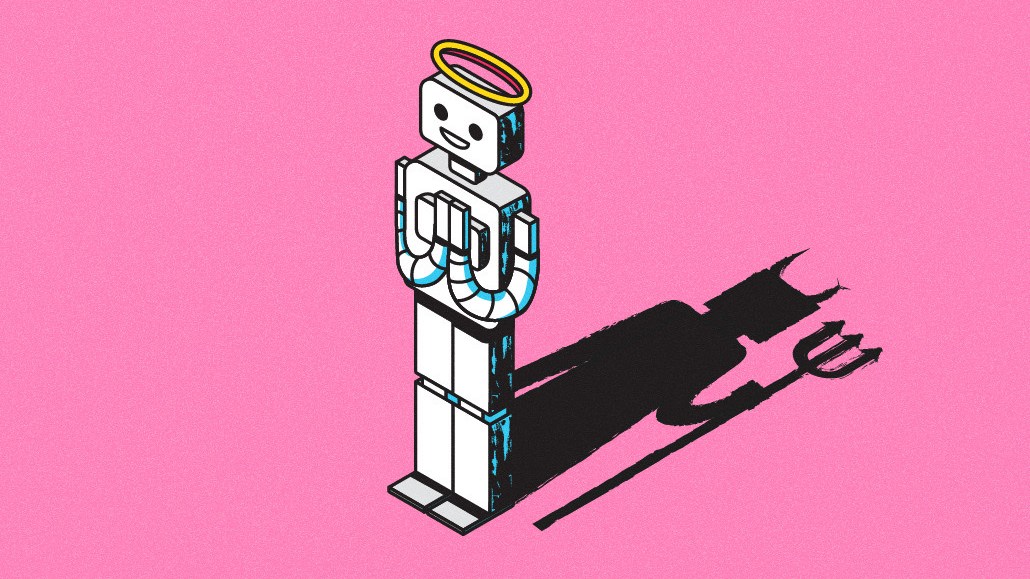Secure your place at the Digiday Media Buying Summit in Nashville, March 2-4
With Canva and Adobe’s new updates, the generative AI race enters the brand design space

Australian design platform Canva today is rolling out new generative AI tools for its Visual Worksuite, with new ways to create custom image templates and presentations, automatically sync video footage to music and translate words in designs into more than 100 languages.
Along with an array of other new features, Canva also is adding new tools specifically for marketing and creative organizations via a new “Brand Hub.” For example, companies can store style guides, scale marketing materials and easily replace logos and images across a company’s designs.
Other recently added generative AI tools from Canva include a “Magic Write” feature for generating text and a text-to-image feature that the company says has already been tested by 60 million users. Both also appear in a new ad campaign that debuted earlier this month.
“I think we view this moment as a significant shift,” said Canva Chief Marketing Officer Zach Kitsche. “And so our question really is, how can we take all of the new technology that’s emerging [and] really unlock the next wave of the design process to ultimately help our community achieve their goals?”
Canva is just one of several major design and visual platforms that are rapidly rolling out new generative AI capabilities. On Tuesday, Adobe unveiled its Firefly platform which features a number of generative AI tools. And just yesterday, the popular game developer platform Unity announced plans for adding a new marketplace for generative AI tools. Other updates in the past week have included Version Five of the AI image creator Midjourney, a new text-to-video model called Gen-2 from Runway — the startup behind the popular text-to-image model Stable Diffusion — and Microsoft’s introduction of a new text-to-image generator for Bing and Edge.
Indeed, the AI sector is growing fast. According to a recent report by Pitchbook, the global market is expected to reach $42.6 billion this year.
The innovations are leading to a new era “where everyone with an idea can and will be able to do something,” said Linus Ekenstam, a Sweden-based designer that’s been consulting brands on how to use various AI tools. A day before Canva announced its latest news, Ekenstam said Adobe’s Firefly “punches good weight” into the generative AI space and that increased competition makes creatives that use the tools the “real winners.”
“You can almost see Adobe being the Mailchimp of design tools, where they kind of just neglected where they came from and went up, up, up, up, up and then forgot to serve the little guy,” Ekenstam said. “Canva saw the hole in the market, tapped it, and became big. Now, Adobe has almost unlimited resources and frankly Canva almost has almost unlimited resources.”
Despite all the hype, there are also major concerns such as copyright questions and worries about misinformation that have marketers wary of entering legal grey areas. Even before the hype around generative AI hit its current fever pitch, marketers were already worried about AI.
According to Gartner research released in December, 70% of marketers surveyed said ethical AI will be a top concern by 2025. And by 2027, 80% expect to create efforts focused on content authenticity, combatting misinformation and dealing with fake material. Gartner also found that 75% of respondents using AI will shift teams from production operations to strategy efforts by 2025.
Generative tools don’t solve everything yet. Andrea Ciulu, head of creative strategy at the Italian agency Arkage, noted that platforms like Midjourney still don’t allow creatives to have final control of an image, which limits their ability to make edits based on brand client feedback. However, Ciulu doesn’t think it’ll be long before that’s fixed. And although AI updates still are often news, Ciulu thinks it won’t be long before AI news bleeds into the background and becomes normalized.
“It’s not a playground anymore,” he said.
More in Marketing

Future of Marketing Briefing: AI’s branding problem is why marketers keep it off the label
The reputational downside is clearer than the branding upside, which makes discretion the safer strategy.

While holdcos build ‘death stars of content,’ indie creative agencies take alternative routes
Indie agencies and the holding company sector were once bound together. The Super Bowl and WPP’s latest remodeling plans show they’re heading in different directions.

How Boll & Branch leverages AI for operational and creative tasks
Boll & Branch first and foremost uses AI to manage workflows across teams.








